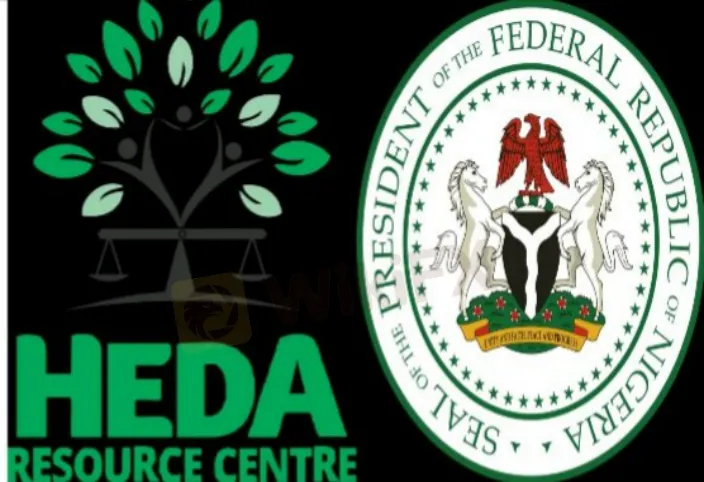简体中文
繁體中文
English
Pусский
日本語
ภาษาไทย
Tiếng Việt
Bahasa Indonesia
Español
हिन्दी
Filippiiniläinen
Français
Deutsch
Português
Türkçe
한국어
العربية
"Sanctions defaulters that sell Forex to BDC" HEDA charges the CBN
Abstract:Given the continued indulgence of the Bureau de Change in Nigeria in the secret sale of Forex to commercial traders, the Human and Environmental Development Agenda (HEDA) of Nigeria has charged the Central Bank of Nigeria (CBN) to sanction any Deposit Money Banks (DMBs) and Bureau de Change (BDC) operators that secretly indulge in the foreign exchange transactions notwithstanding the withdrawal of license to do from them last year.
By: Damian Okonkwo

Given the continued indulgence of the Bureau de Change in Nigeria in the secret sale of Forex to commercial traders, the Human and Environmental Development Agenda (HEDA) of Nigeria has charged the Central Bank of Nigeria (CBN) to sanction any Deposit Money Banks (DMBs) and Bureau de Change (BDC) operators that secretly indulge in the foreign exchange transactions notwithstanding the withdrawal of license to do from them last year.
According to some individual observations, some DMB have secretly continued to sell Forex to BDC across the counter who proceeded to at a higher rate to retail traders going against the policy of the CBN to regulate and monitor the sale of Forex in Nigeria with the hope of providing a uniform price for the forex rate and reducing the price hikes caused in the past by BDC when they were charged with the task of forex sales to both travelers and retail traders.
In an official statement at the end of the Monetary Policy Committee (MPC) meeting held in July 2021, the CBN Governor, Godwin Emefiele had announced the stoppage of Forex sale to BDC operators and assured that the CBN will control the sale of Forex as to help reduce the hoarding and hikes caused by BDC previously which often led to high exchange rates for forex within the country.
In an official statement from it's Chairman - Olanrewaju Suraju, HEDA charged CBN to stick firmly to it's policy and prosecute any DMB secretly indulging in the continued sale of Forex to BDC.
According to the new policy of the CBN on Forex sales to the public, only the CBN is to sell Forex to DMBs for onward sale to the public for Personal Travel Allowance (PTA), Business Travel Allowance (BTA), tuition fees, medical payments, Small and Mdium-sized Enterprises (SMEs) transactions among others. The BDC is no longer to have a hand in this chain of business.
Similarly, this new policy by the CBN seeks to reduce all forms of money laundering within the country using the BDC and to ensure that taxes are paid for all inflows coming into the country.
Consequently, the civil society group - HEDA charged the CBN to be strick in prosecuting all defaulters to this policy. Here Suraju regrettably observed that enough punishment have not been put in place for defaulters in his words: It appears the measure is insufficient as a deterrent for defaulters, as this act of economic sabotage is still perpetrated non-stop by unscrupulous members of the society.
Further he revealed that “those who fraudulently collect foreign currencies and sell to BDCs or black market vendors are clearly causing economic adversity to the Federal Republic of Nigeria. Their action is not only fraudulent, it is clearly a financial crime and economic sabotage.”
To this end, the Chairman of the committee recommended that, in addition to the above measure, the CBN should direct all DMBs to report such law-breakers to the Economic and Financial Crimes Commission (EFCC) for investigation of possible money laundering offences and illicit financial flow and onward prosecution, if found culpable.
Finally the the body arrived at the conclusion that reporting and punishing defaulters will help to restore sanity in the system and curtail the secret sale of Forex to BDC. In this words: “We strongly believe that adopting our recommendation will fortify this CBN policy on Forex transaction for the benefit of the Nigerian economy and help to stabilise the naira against other foreign currencies.”
The body finally pledged their commitment in supporting the CBN in it's fight against corruption and illicit financial in-flow into the country.

Disclaimer:
The views in this article only represent the author's personal views, and do not constitute investment advice on this platform. This platform does not guarantee the accuracy, completeness and timeliness of the information in the article, and will not be liable for any loss caused by the use of or reliance on the information in the article.
Read more

WikiFX Review: Is IVY Markets Reliable?
IVY Markets, established in 2018, positions itself as a global brokerage offering a diverse range of trading instruments, including Forex, Commodities, Cryptocurrencies, and Stocks. The platform provides two primary account types—Standard and PRO—with a minimum deposit requirement of $50 and leverage up to 1:400.

Germany's Election: Immigration, Economy & Political Tensions Take Centre Stage
Germany is set to hold a crucial general election on 23 February 2025, with voter frustration over migration emerging as a dominant issue.

ED Exposed US Warned Crypto Scam ”Bit Connect”
The Indian Enforcement Directorate (ED) recently exposed a crypto Scam from a firm called Bitconnect. During the investigation, which took place on February 11th and 15th, 2025. The authority recovered bitcoin worth approximately Rs 1,646 crore & Rs 13.50 Lakh in cash, a Lexus car, and digital devices. This investigation was conducted under the provisions of the Prevention of Money Laundering Act (PMLA) of 2002.

XTB Secures Chilean License, Expands Latin America Footprint
XTB gains a securities agent license in Chile, boosting its Latin America presence. The broker plans to offer stocks, ETFs, and derivatives to local investors.
WikiFX Broker
Latest News
Germany's Election: Immigration, Economy & Political Tensions Take Centre Stage
WikiFX Review: Is IVY Markets Reliable?
IG 2025 Most Comprehensive Review
ED Exposed US Warned Crypto Scam ”Bit Connect”
Top Profitable Forex Trading Strategies for New Traders
EXNESS 2025 Most Comprehensive Review
Currency Calculator






